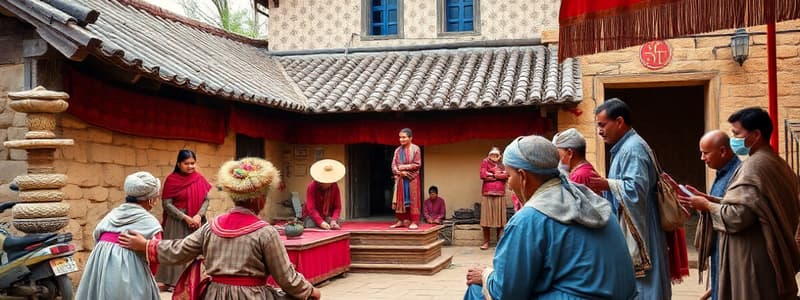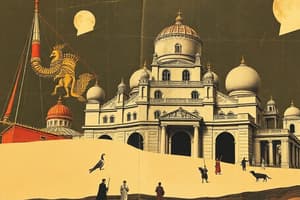Podcast
Questions and Answers
संस्कृति के इतिहास का अध्ययन किस बात का विश्लेषण करता है?
संस्कृति के इतिहास का अध्ययन किस बात का विश्लेषण करता है?
- सिर्फ भोजन संबंधी प्रथाएँ
- केवल भाषाई विकास
- परंपराओं और रीति-रिवाजों (correct)
- सिर्फ धार्मिक मान्यताओं
किस परिदृश्य का महत्व 'मानवतावाद' और 'व्यक्तिवाद' में देखा जाता है?
किस परिदृश्य का महत्व 'मानवतावाद' और 'व्यक्तिवाद' में देखा जाता है?
- रिनेसाँस (correct)
- प्रकाशन युग
- युद्धकाल
- औद्योगिक क्रांति
कौन सा प्रमुख विचारक संस्कृति के सामाजिक जीवन में उसके प्रभाव का अध्ययन करता है?
कौन सा प्रमुख विचारक संस्कृति के सामाजिक जीवन में उसके प्रभाव का अध्ययन करता है?
- मिशेल फौकॉल्ट
- कार्ल मार्क्स
- एमील डर्काइम (correct)
- जोहान गॉटफ्राइड हरडर
संस्कृति की किस शाखा में विमर्श और शक्ति के बीच संबंध का विश्लेषण किया जाता है?
संस्कृति की किस शाखा में विमर्श और शक्ति के बीच संबंध का विश्लेषण किया जाता है?
वैश्वीकरण का समाज पर कौन सा प्रभाव है?
वैश्वीकरण का समाज पर कौन सा प्रभाव है?
किस ऐतिहासिक घटना ने सांस्कृतिक अभिव्यक्ति में महत्वपूर्ण बदलाव लाए?
किस ऐतिहासिक घटना ने सांस्कृतिक अभिव्यक्ति में महत्वपूर्ण बदलाव लाए?
संस्कृति के अध्ययन में कौन सी विधि विभिन्न समाजों के विकास की तुलना करती है?
संस्कृति के अध्ययन में कौन सी विधि विभिन्न समाजों के विकास की तुलना करती है?
डिजिटल संस्कृति का अध्ययन किस पहलू पर केंद्रित है?
डिजिटल संस्कृति का अध्ययन किस पहलू पर केंद्रित है?
Flashcards are hidden until you start studying
Study Notes
Cultural History
-
Definition: Cultural history studies the cultural practices, beliefs, and expressions of societies throughout time, examining how culture shapes and is shaped by historical events.
-
Key Components:
- Art: Examines visual arts, literature, music, and performance; reflects societal values and changes.
- Religion: Analyzes belief systems, rituals, and institutions; influences social norms and conflicts.
- Traditions: Studies customs, rituals, and folklore; reveals continuity and change in cultural practices.
- Language: Investigates linguistic developments and usage; reflects identity, power dynamics, and social changes.
- Food: Explores dietary customs and agriculture; illustrates cultural exchanges and societal structures.
-
Approaches:
- Thematic: Focuses on specific cultural themes (e.g., gender, class, race).
- Comparative: Compares cultural developments across different societies or periods.
- Interdisciplinary: Integrates methods from history, anthropology, sociology, and other fields.
-
Significant Periods:
- Renaissance: Flourishing of arts and science; emphasis on humanism and individualism.
- Enlightenment: Intellectual movement promoting reason and skepticism of tradition; significant changes in philosophy and politics.
- Industrial Revolution: Transformation in social structures, urbanization, and changes in daily life and labor.
-
Influential Figures:
- Johann Gottfried Herder: Advocated for a cultural relativism perspective and the importance of folklore.
- Emile Durkheim: Explored the role of culture in social life through collective representations and norms.
- Michel Foucault: Analyzed how cultural discourse shapes knowledge and power dynamics.
-
Case Studies:
- The American Civil Rights Movement: Examines cultural expressions through literature, music, and protests.
- Postcolonial Studies: Investigates cultural impacts of colonialism and the emergence of hybrid identities.
-
Current Trends:
- Globalization: Impact on cultural exchange and the blending or clashing of cultural identities.
- Digital Culture: Study of how the internet and social media reshape cultural engagement and identity formation.
- Cultural Memory: Focus on how societies remember and represent their past through various cultural forms.
सांस्कृतिक इतिहास (Cultural History)
- सांस्कृतिक इतिहास समाजों के सांस्कृतिक व्यवहारों, मान्यताओं और अभिव्यक्तियों का अध्ययन है, जो यह जांचता है कि कैसे संस्कृति ऐतिहासिक घटनाओं को आकार देती है और उनसे आकार लेती है।
प्रमुख घटक (Key Components)
- कला (Art): दृश्य कला, साहित्य, संगीत और प्रदर्शन का परीक्षण; सामाजिक मूल्यों और परिवर्तनों को दर्शाता है।
- धर्म (Religion): विश्वास प्रणाली, अनुष्ठानों और संस्थानों का विश्लेषण; सामाजिक मानदंडों और संघर्षों को प्रभावित करता है।
- परंपराएँ (Traditions): रीति-रिवाजों, अनुष्ठानों और लोककथाओं का अध्ययन; सांस्कृतिक व्यवहारों में निरंतरता और परिवर्तन को प्रकट करता है।
- भाषा (Language): भाषाई विकास और उपयोग की जांच; पहचान, शक्ति गतिकी और सामाजिक परिवर्तनों को दर्शाता है।
- भोजन (Food): आहार संबंधी रीति-रिवाजों और कृषि का अन्वेषण; सांस्कृतिक आदान-प्रदान और सामाजिक संरचनाओं को दर्शाता है।
दृष्टिकोण (Approaches)
- विषयगत (Thematic): विशिष्ट सांस्कृतिक विषयों (जैसे, लिंग, वर्ग, जाति) पर केंद्रित है।
- तुलनात्मक (Comparative): विभिन्न समाजों या अवधियों में सांस्कृतिक विकास की तुलना करता है।
- अंतःविषयक (Interdisciplinary): इतिहास, मानवशास्त्र, समाजशास्त्र और अन्य क्षेत्रों के तरीकों को एकीकृत करता है।
महत्वपूर्ण अवधि (Significant Periods)
- पुनर्जागरण (Renaissance): कला और विज्ञान का उत्कर्ष; मानवतावाद और व्यक्तिवाद पर जोर।
- प्रबुद्धता (Enlightenment): तर्क को बढ़ावा देने वाला बौद्धिक आंदोलन और परंपरा का संशयवाद; दर्शन और राजनीति में महत्वपूर्ण परिवर्तन।
- औद्योगिक क्रांति (Industrial Revolution): सामाजिक संरचनाओं, शहरीकरण और दैनिक जीवन और श्रम में परिवर्तन।
प्रभावशाली व्यक्ति (Influential Figures)
- जोहान गॉटफ्रीड हेर्डर (Johann Gottfried Herder): सांस्कृतिक सापेक्षतावादी दृष्टिकोण और लोककथाओं के महत्व की वकालत की।
- एमिल दुर्खीम (Emile Durkheim): सामूहिक प्रतिनिधित्व और मानदंडों के माध्यम से सामाजिक जीवन में संस्कृति की भूमिका का पता लगाया।
- मिशेल फूको (Michel Foucault): विश्लेषण किया कि कैसे सांस्कृतिक प्रवचन ज्ञान और शक्ति गतिकी को आकार देता है।
केस स्टडीज (Case Studies)
- अमेरिकी नागरिक अधिकार आंदोलन (The American Civil Rights Movement): साहित्य, संगीत और विरोधों के माध्यम से सांस्कृतिक अभिव्यक्तियों की जांच करता है।
- पश्चात औपनिवेशिक अध्ययन (Postcolonial Studies): उपनिवेशवाद के सांस्कृतिक प्रभावों और संकर पहचान के उदय की जांच करता है।
वर्तमान रुझान (Current Trends)
- वैश्वीकरण (Globalization): सांस्कृतिक आदान-प्रदान और सांस्कृतिक पहचान के मिश्रण या टकराव पर प्रभाव।
- डिजिटल संस्कृति (Digital Culture): इंटरनेट और सोशल मीडिया कैसे सांस्कृतिक जुड़ाव और पहचान निर्माण को नया रूप देते हैं, इसका अध्ययन।
- सांस्कृतिक स्मृति (Cultural Memory): विभिन्न सांस्कृतिक रूपों के माध्यम से समाज अपने अतीत को कैसे याद करते हैं और उसका प्रतिनिधित्व करते हैं, इस पर ध्यान केंद्रित करना।
Studying That Suits You
Use AI to generate personalized quizzes and flashcards to suit your learning preferences.




